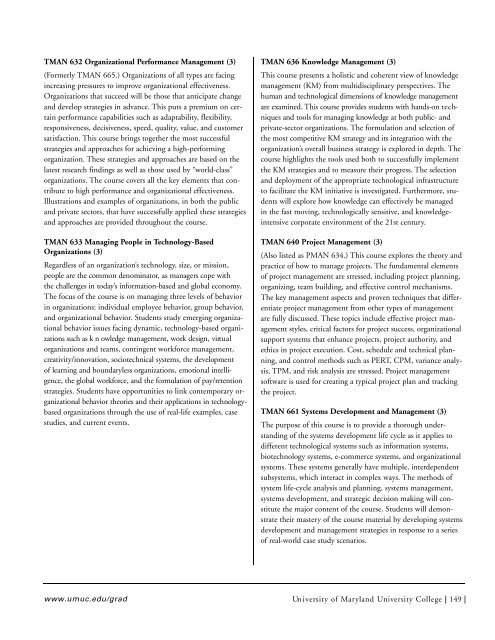A+B. Intro_SJ.1 - University of Maryland University College
A+B. Intro_SJ.1 - University of Maryland University College
A+B. Intro_SJ.1 - University of Maryland University College
You also want an ePaper? Increase the reach of your titles
YUMPU automatically turns print PDFs into web optimized ePapers that Google loves.
TMAN 632 Organizational Performance Management (3)<br />
(Formerly TMAN 665.) Organizations <strong>of</strong> all types are facing<br />
increasing pressures to improve organizational effectiveness.<br />
Organizations that succeed will be those that anticipate change<br />
and develop strategies in advance. This puts a premium on certain<br />
performance capabilities such as adaptability, flexibility,<br />
responsiveness, decisiveness, speed, quality, value, and customer<br />
satisfaction. This course brings together the most successful<br />
strategies and approaches for achieving a high-performing<br />
organization. These strategies and approaches are based on the<br />
latest research findings as well as those used by “world-class”<br />
organizations. The course covers all the key elements that contribute<br />
to high performance and organizational effectiveness.<br />
Illustrations and examples <strong>of</strong> organizations, in both the public<br />
and private sectors, that have successfully applied these strategies<br />
and approaches are provided throughout the course.<br />
TMAN 633 Managing People in Technology-Based<br />
Organizations (3)<br />
Regardless <strong>of</strong> an organization’s technology, size, or mission,<br />
people are the common denominator, as managers cope with<br />
the challenges in today’s information-based and global economy.<br />
The focus <strong>of</strong> the course is on managing three levels <strong>of</strong> behavior<br />
in organizations: individual employee behavior, group behavior,<br />
and organizational behavior. Students study emerging organizational<br />
behavior issues facing dynamic, technology-based organizations<br />
such as k n owledge management, work design, virt u a l<br />
organizations and teams, contingent workforce management,<br />
c re a t i v i t y / i n n ovation, sociotechnical systems, the development<br />
<strong>of</strong> learning and boundaryless organizations, emotional intelligence,<br />
the global work f o rce, and the formulation <strong>of</strong> pay/re t e n t i o n<br />
strategies. Students have opportunities to link contemporary organizational<br />
behavior theories and their applications in technologybased<br />
organizations through the use <strong>of</strong> real-life examples, case<br />
studies, and current events.<br />
TMAN 636 Knowledge Management (3)<br />
This course presents a holistic and coherent view <strong>of</strong> knowledge<br />
management (KM) from multidisciplinary perspectives. The<br />
human and technological dimensions <strong>of</strong> knowledge management<br />
a re examined. This course provides students with hands-on t e c h-<br />
niques and tools for managing knowledge at both public- and<br />
private-sector organizations. The formulation and selection <strong>of</strong><br />
the most competitive KM strategy and its integration with the<br />
organization’s overall business strategy is explored in depth. The<br />
course highlights the tools used both to successfully implement<br />
the KM strategies and to measure their progress. The selection<br />
and deployment <strong>of</strong> the appropriate technological infrastructure<br />
to facilitate the KM initiative is investigated. Furthermore, students<br />
will explore how knowledge can effectively be managed<br />
in the fast moving, technologically sensitive, and knowledgeintensive<br />
corporate environment <strong>of</strong> the 21st century.<br />
TMAN 640 Project Management (3)<br />
(Also listed as PMAN 634.) This course explores the theory and<br />
practice <strong>of</strong> how to manage projects. The fundamental elements<br />
<strong>of</strong> project management are stressed, including project planning,<br />
organizing, team building, and effective control mechanisms.<br />
The key management aspects and proven techniques that differentiate<br />
project management from other types <strong>of</strong> management<br />
are fully discussed. These topics include effective project management<br />
styles, critical factors for project success, organizational<br />
support systems that enhance projects, project authority, and<br />
ethics in project execution. Cost, schedule and technical planning,<br />
and control methods such as PERT, CPM, variance analysis,<br />
TPM, and risk analysis are stressed. Project management<br />
s<strong>of</strong>tware is used for creating a typical project plan and tracking<br />
the project.<br />
TMAN 661 Systems Development and Management (3)<br />
The purpose <strong>of</strong> this course is to provide a thorough understanding<br />
<strong>of</strong> the systems development life cycle as it applies to<br />
different technological systems such as information systems,<br />
biotechnology systems, e-commerce systems, and organizational<br />
systems. These systems generally have multiple, interdependent<br />
subsystems, which interact in complex ways. The methods <strong>of</strong><br />
system life-cycle analysis and planning, systems management,<br />
systems development, and strategic decision making will constitute<br />
the major content <strong>of</strong> the course. Students will demonstrate<br />
their mastery <strong>of</strong> the course material by developing systems<br />
development and management strategies in response to a series<br />
<strong>of</strong> real-world case study scenarios.<br />
w w w. u m u c . e d u / g r a d<br />
Un i versity <strong>of</strong> Ma r yland Un i versity <strong>College</strong> | 149 |

















